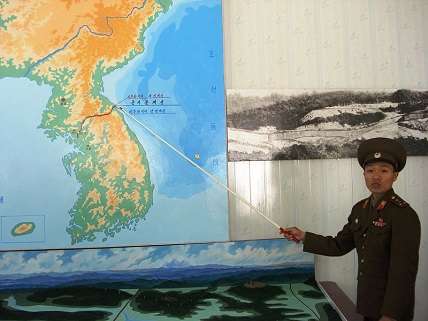The Korean War is Not Over: North Korea Declares Armistice Null, United Nations Disagrees
Sixty years of armistice not going anywhere too soon

North Korea's at it again, declaring last week that the Korean War armistice was over and shutting down its hot line to South Korea and the two countries' shared border point. The United Nations stepped in today and said, no, the armistice isn't over. It's not the first time that North Korea's declared the armistice null and void. It did so for the first time in 1994, just a few months before the death of Kim Il-Sung, North Korea's totalitarian leader since the country's inception, and then again in 1996, 2003 (the same year it withdrew from the nuclear non-proliferation treaty), 2006, and 2009. The latest declaration comes after a series of missile tests and just a few days before North Korea reiterated its threat to launch a nuclear strike against the U.S. (No, it can't, according the White House). Now the United States and South Korea are pushing for tougher scrutiny from the U.N. of North Korea's human rights record (easily the worst in the world).
North Korea itself is the product of the post-war UN-backed occupation of the Korean peninsula (the USSR administered the North, the U.S. the South). Elections to be held on the peninsula in 1948 never materialized, and the USSR helped Kim Sung-Il establish a communist government based out of Pyongyang. In 1950, the North invaded the South. The United Nations Security Council authorized a UN force (backed primarily by the United States) to repel the North Korean attack—the Soviet Union, which could've vetoed the resolution, was boycotting the Security Council over the UN's recognition of the Kuomingtang government (Taiwan) as the holder of China's seat and not the communists who had taken over mainland China a year earlier. Three years later, the armistice was signed between U.S. Lt. General William Harrison (on behalf of the United Nations Command) and North Korean General Nam Il, with a border not too far from the 38th parallel that divided the peninsula before the war. The armistice established a ceasefire, a protocol for the return of prisoners of war (naturally, many North Korean and Chinese POWs did not want to be repatriated to their homelands), and for talks among the "countries concerned" (the two Koreas, the US, the USSR, China, the UN) that would lead to a "peaceful settlement of the Korean question."
The armistice will turn 60 this summer, with no sign of any settlement of "the Korean question." Instead, North Korea is determined to acquire nuclear weapons capabilities, and South Korea is getting there.


Show Comments (47)